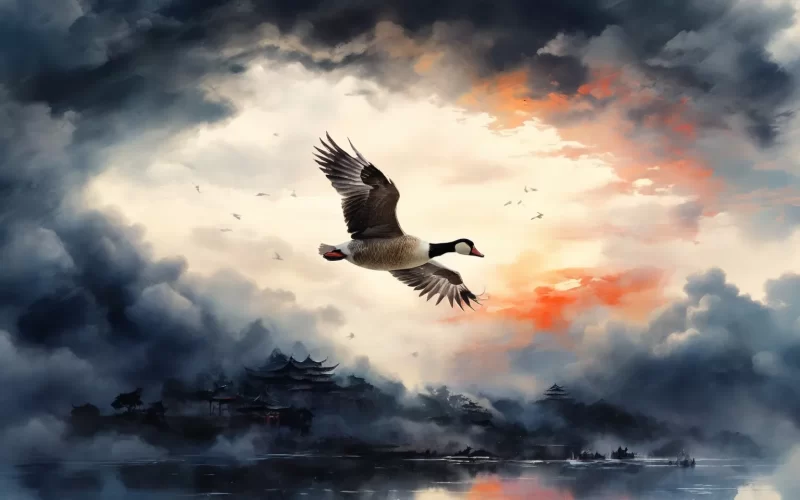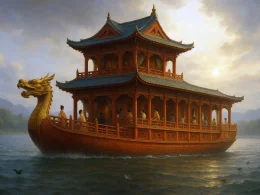Farther and farther from the three Ba Roads,
I have come three thousand miles, anxious and watchful,
Through pale snow-patches in the jagged nightmountains --
A stranger with a lonely lantern shaken in the wind.
...Separation from my kin
Binds me closer to my servants --
Yet how I dread, so far adrift,
New Year's Day, tomorrow morning!
Original Poem
「除夜有怀」
崔涂
迢递三巴路,羁危万里身。
乱山残雪夜,孤独异乡春。
渐与骨肉远,转于僮仆亲。
那堪正飘泊,明日岁华新。
Interpretation
Composed on Lunar New Year's Eve during the late Tang Dynasty, this poem expresses the profound loneliness of exile. Having wandered for years through the remote Ba-Shu region (modern Sichuan), Cui Tu here channels his accumulated homesickness into verse. While households across China reunite amid festive lanterns, the poet remains adrift—his "New Year's reflections" conveying not celebration but boundless melancholy.
First Couplet: « 迢递三巴路,羁危万里身。 »
Tiáodì sān bā lù, jī wēi wànlǐ shēn.
The twisting paths of Three Ba lands extend; This fragile self drifts ten thousand li from home.
The opening establishes the harsh geography of exile. "Three Ba" (ancient Sichuan's rugged terrain) recalls Li Bai's "roads harder than scaling blue sky," while "fragile self" (羁危身) underscores human vulnerability against vast distances.
Second Couplet: « 乱山残雪夜,孤独异乡春。 »
Luàn shān cán xuě yè, gūdú yìxiāng chūn.
Amid jagged peaks and lingering snow— Alone, I greet spring in alien lands.
The camera-like focus reveals a desolate scene: fractured mountains, stubborn winter, and the cruel irony of spring's arrival bringing no joy. The "lingering snow" becomes metaphor for frozen time and unthawing sorrow.
Third Couplet: « 渐与骨肉远,转于僮仆亲。 »
Jiàn yǔ gǔròu yuǎn, zhuǎn yú tóngpú qīn.
Flesh-and-blood ties grow ever faint; A servant's face becomes familiar kin.
Here, exile's true tragedy emerges—not just physical displacement but emotional rearrangement. The forced intimacy with servants highlights the erosion of fundamental human connections.
Fourth Couplet: « 那堪正飘泊,明日岁华新。 »
Nàkān zhèng piāobó, míngrì suìhuá xīn.
How bear this rootless state tonight, When dawn will brandish spring's new light?
The devastating conclusion pits cyclical renewal against linear despair. The New Year's inevitable arrival—typically symbolizing hope—here becomes an affront, its "new light" scorching the poet's unchanging exile.
Holistic Appreciation
This poem captures the poet's profound loneliness and heartfelt nostalgia during the New Year's Eve, a time traditionally meant for family reunion. Through vivid spatial imagery ("the winding roads of Three Ba regions") and temporal markers ("tomorrow's dawn renews the year"), it constructs a poignant homescape that spans both geography and season. The first two couplets establish a desolate, wintry atmosphere, while the latter two gradually reveal the poet's inner turmoil, creating a seamless emotional progression that is deeply moving. The poem's melancholic yet sincere tone reflects both the spiritual weariness of literati during turbulent times and their deep yearning for belonging.
Artistic Merits
The poem demonstrates meticulous structure and clear compositional logic, progressing naturally from environmental depiction to psychological portrayal. The poet masterfully employs contrasts: between "jagged mountains" and "spring's arrival," between "flesh and blood" and "servants," between "rootless drifting" and "renewed year" - these juxtapositions intensify the sense of homesickness. Written in unadorned yet genuine language, it exemplifies the typical emotional expression of late-Tang wandering scholars. Particularly striking is the line "Alone I greet spring in foreign lands," where the seasonal renewal ironically underscores the poet's isolation. The overall style, somber and halting, embodies the pathos and gravity characteristic of late Tang poetry, mirroring the poet's profound realization of the imbalance between ideals and reality.
Insights
This poem reminds us that behind festive reunions lie countless wanderers unable to return home. It not only expresses an individual's emotional experience but also reflects the collective nostalgia and sense of displacement common among intellectuals in turbulent eras. Today, its deep longing for homeland and family still resonates, urging us to cherish present reunions while remembering those distant figures and unreturned hearts. The work ultimately transcends its historical context to speak to universal human experiences of separation and the enduring need for connection.
Poem translator
Kiang Kanghu
About the poet
Cui Tu(崔涂), should be today's China zhejiang tonglu, jiande area people. Xizong Guangqi bachelor, strong guest Bashu, the old tour of Longshan, so much to write travel sad work.












